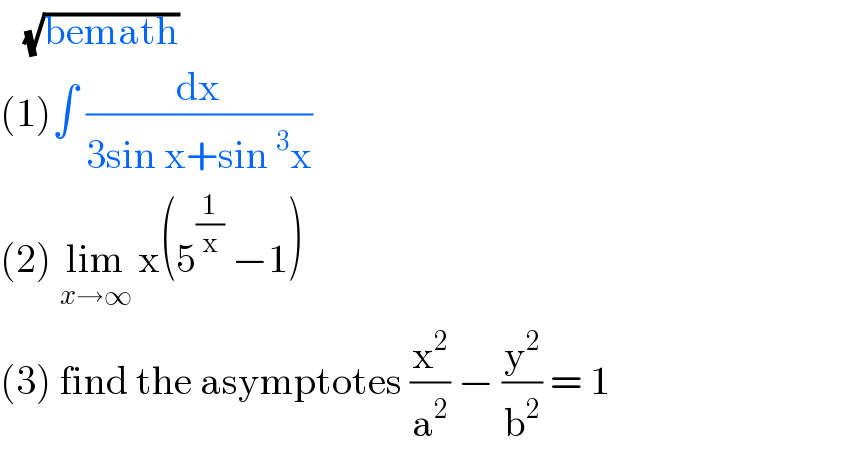
Question and Answers Forum
Question Number 111083 by bemath last updated on 02/Sep/20

Answered by john santu last updated on 02/Sep/20

Answered by john santu last updated on 02/Sep/20
![(3) let the asymptotes is y = mx+c where m = lim_(x→∞) ((y/x)) m=lim_(x→∞) ((±b (√(x^2 −a^2 )))/(ax)) = ((±b)/a)lim_(x→∞) (√(1−(a^2 /x^2 ))) = ± (b/a) and c = lim_(x→∞) (y−mx) = lim_(x→∞) [±(b/a)(√(x^2 −a^2 ))−(±((bx)/a)) ] = ±(b/a)lim_(x→∞) ((√(x^2 −a^2 )) −x ) = ±(b/a) lim_(x→∞) ((−a^2 )/( (√(x^2 −a^2 ))+x)) = 0 Hence, the asymptotes of (x^2 /a^2 ) − (y^2 /b^2 ) = 1 is y = ±(b/a)x](Q111088.png)
Commented by bobhans last updated on 02/Sep/20

| ||
Question and Answers Forum | ||
Question Number 111083 by bemath last updated on 02/Sep/20 | ||
 | ||
Answered by john santu last updated on 02/Sep/20 | ||
 | ||
| ||
Answered by john santu last updated on 02/Sep/20 | ||
![(3) let the asymptotes is y = mx+c where m = lim_(x→∞) ((y/x)) m=lim_(x→∞) ((±b (√(x^2 −a^2 )))/(ax)) = ((±b)/a)lim_(x→∞) (√(1−(a^2 /x^2 ))) = ± (b/a) and c = lim_(x→∞) (y−mx) = lim_(x→∞) [±(b/a)(√(x^2 −a^2 ))−(±((bx)/a)) ] = ±(b/a)lim_(x→∞) ((√(x^2 −a^2 )) −x ) = ±(b/a) lim_(x→∞) ((−a^2 )/( (√(x^2 −a^2 ))+x)) = 0 Hence, the asymptotes of (x^2 /a^2 ) − (y^2 /b^2 ) = 1 is y = ±(b/a)x](Q111088.png) | ||
| ||
Commented by bobhans last updated on 02/Sep/20 | ||
 | ||